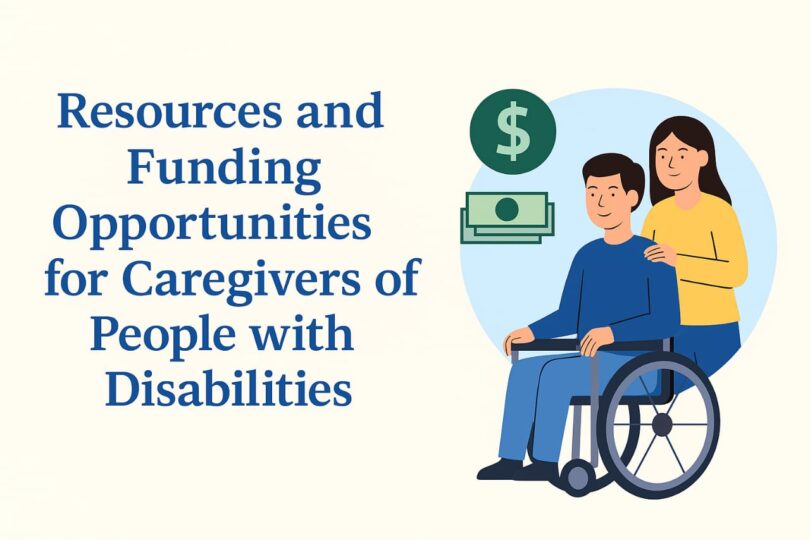Advertisements
Caregivers of people with disabilities play one of the most vital roles in society. They provide essential support that ensures individuals with disabilities can live healthier, safer, and more fulfilling lives. However, caregiving often comes with emotional stress, financial strain, and limited access to personal time.
To ease these challenges, a wide range of resources and funding opportunities are available across the United States in 2025. These programs provide financial relief, education, respite care, and other vital services that empower caregivers to continue their important work.
This article explores the top funding opportunities and resources for caregivers of people with disabilities, how to access them, and the positive impact they bring to both caregivers and their loved ones.
Advertisements
Understanding the Needs of Caregivers
Caregivers often balance multiple responsibilities including medical care, transportation, financial management, and emotional support. Many caregivers reduce work hours or leave their jobs entirely to provide full-time care. This can create significant financial stress. Without proper funding and resources, caregivers may experience burnout, reduced quality of life, and health issues of their own.
Support programs help address these issues by covering costs, offering training, and providing respite opportunities that allow caregivers to rest and recharge.
Advertisements
Federal Resources and Funding Programs
Medicaid Home and Community Based Services (HCBS)
HCBS waivers allow individuals with disabilities to receive care in their homes or communities instead of institutional facilities. Caregivers may be compensated for providing in-home support, and families may access funding for services such as home modifications and transportation.
Social Security Programs
The Social Security Administration offers Supplemental Security Income (SSI) and Social Security Disability Insurance (SSDI). While these are directed at individuals with disabilities, the benefits often extend to families and caregivers by providing financial stability.
National Family Caregiver Support Program (NFCSP)
The NFCSP provides grants to states to fund services that support family caregivers. Services may include information, counseling, training, and respite care. Many caregivers find this program essential for maintaining balance between caregiving duties and personal responsibilities.
State and Local Caregiver Support Programs
Every state offers unique caregiver support resources. State-based programs may include direct financial stipends for caregivers, respite care vouchers, and tax credits. Local agencies such as Area Agencies on Aging often manage caregiver services, making it easier to access help within specific communities.
For example, some states provide monthly payments to family caregivers who assist Medicaid beneficiaries. Others offer financial assistance for home modifications that make daily caregiving safer and more manageable.
Nonprofit and Community Based Resources
Nonprofit organizations and community groups play a key role in supporting caregivers of people with disabilities. Some leading organizations include:
-
Easterseals: Offers respite care, support groups, and training programs for caregivers.
-
The Arc of the United States: Provides advocacy, financial planning tools, and assistance programs for families and caregivers.
-
Family Caregiver Alliance (FCA): Offers educational resources, policy advocacy, and direct support services tailored to caregivers.
-
National Alliance for Caregiving (NAC): Publishes research and guides while connecting caregivers with funding opportunities and support networks.
Community foundations also provide micro-grants that can cover transportation, therapy, or specialized equipment.
Employer and Workplace Resources
Some employers now recognize the challenges caregivers face and offer workplace benefits to support them. Resources may include paid family leave, flexible schedules, or Employee Assistance Programs (EAPs) that connect caregivers to counseling and financial guidance.
Employers may also offer partnerships with nonprofit organizations to provide training or access to funding programs. These benefits not only improve the well-being of caregivers but also increase productivity and job satisfaction.
Financial Planning and Tax Benefits
Caregivers can also take advantage of financial planning resources and tax benefits.
-
Dependent Care Tax Credit: Provides tax relief for caregiving expenses such as adult day care services.
-
Flexible Spending Accounts (FSAs): Some employers allow caregivers to set aside pre-tax income for care-related expenses.
-
Special Needs Trusts: Help families plan for long-term financial security of loved ones with disabilities while preserving eligibility for public benefits.
Consulting a financial advisor who specializes in disability and caregiving can maximize access to these benefits.
Training and Educational Resources
Proper training can make caregiving more effective and less stressful. Many organizations provide free or low-cost training for caregivers in areas such as medical care, stress management, and financial planning. Examples include:
-
Online caregiver training modules provided by state agencies
-
Workshops and webinars hosted by disability advocacy groups
-
Certification programs funded by nonprofit organizations
These resources improve caregiver confidence and reduce the risk of errors in care delivery.
How to Access Caregiver Funding Opportunities
Accessing caregiver resources requires research and organization. Here are key steps:
-
Start with government websites such as Benefits.gov or Medicaid.gov to explore federal and state programs.
-
Contact local agencies such as Area Agencies on Aging or Disability Services Offices.
-
Reach out to nonprofit organizations that specialize in disability and caregiving support.
-
Consult with financial planners for long-term strategies and tax benefits.
-
Join caregiver support groups to stay informed about new funding opportunities.
The Impact of Financial Support on Caregivers
Financial and resource support provides caregivers with relief, reduces stress, and improves the quality of care for individuals with disabilities. When caregivers have access to proper funding and resources, they are better equipped to maintain their own health, preserve financial stability, and continue their vital role without burnout.
Ultimately, investing in caregiver support benefits not only families but also communities and the healthcare system as a whole.
Conclusion
Caregivers of people with disabilities provide critical support that often goes unrecognized. Thankfully, an expanding range of resources and funding opportunities is now available in 2025. From federal programs and state initiatives to nonprofit grants and workplace benefits, caregivers can find financial relief and practical support.
By taking advantage of these programs, caregivers can achieve balance, reduce stress, and continue their essential work with greater confidence and stability.
Explore caregiver resources today and discover the financial support that can empower you and your loved ones.
Advertisements



Leave a Comment